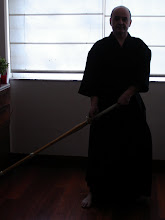Ippon (n.): The act of successfully scoring a waza in kendo. The act of striking with ki-ken-tai-no-itchi.
Ki-ken-tai-no-itchi (n.): A term which expresses an important element in moving for offense and defense; it is mainly used in teaching striking moves. Ki is spirit, ken refers to the handling of the shinai, and tai refers to the body movements and posture. When there three elements harmonize and function together with the correct timing, they create the conditions for a valid strike.
Yuko-datotsu (n.): Making a valid strike. A valid strike which is considered ippon. According to the rules, a waza is complete when the following conditions are met: showing a fullness of spirit and appropriate posture, striking a datotsu-bui (striking zone) of the opponent with the striking region of one’s own shinai while using correct ha-suji, and expressing zan-shin.
If the necessary conditions are met, ippon is also given in the following cases: when ones strikes the opponent as soon as the opponent drops his/her shinai, steps out of court, or falls down, and when one strikes the opponent just as the signal for the end of match is given.
Ippon is not given in the following cases: when both players simultaneously make valid strikes and when one player makes a valid strike but the opponent shows full spirit and proper posture and the tip of his/her shinai is on the front of the chest of the striking player.
































